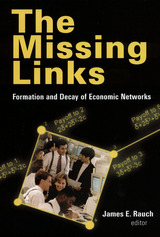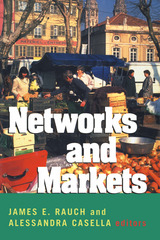2 books about Rauch, James E.

The Missing Links
Formation and Decay of Economic Networks
James E. Rauch
Russell Sage Foundation, 2007
Half of all workers are hired through personal referrals, and networks of social connections channel the flows of capital, technology, and international trade. Sociologists and economists alike recognize that economic exchange is shaped by social networks, which propagate information and facilitate trust, but each discipline brings a distinct theoretical perspective to the study of networks. Sociologists have focused on how networks shape individual behavior, economists on how individual choices shape networks. The Missing Links is a bold effort by an interdisciplinary group of scholars to synthesize sociological and economic theories of how economic networks emerge and evolve. Interweaving sophisticated theoretical models and concrete case studies, The Missing Links is both an introduction to the study of economic networks and a catalyst for further research. Economists Rachel Kranton and Deborah Minehart illustrate their field's approach to modeling network formation, showing how manufacturers form networks of suppliers in ways that maximize profits. Exemplifying the sociological approach, Ronald Burt analyzes patterns of cooperation and peer evaluations among colleagues at a financial organization. He finds that dense connections of shared acquaintances lead to more stable reputations. In the latter half of the book, contributors combine the insights of sociology and economics to explore a series of case studies. Ray Reagans, Ezra Zuckerman, and Bill McEvily investigate an R & D firm in which employees participate in overlapping collaborative teams, allowing the authors to disentangle the effects of network structure and individual human capital on team performance. Kaivan Munshi and Mark Rosenzweig examine how economic development and rising inequality in India are reshaping caste-based networks of mutual insurance and job referrals. Their study shows that people's economic decisions today are shaped both by the legacy of the caste hierarchies and by the particular incentives and constraints that each individual faces in an evolving labor market. Economic globalization is forging new connections between people in distant corners of the world, while unsettling long-standing social relations. Anyone interested in understanding the opportunities and challenges of this era of rapid change will find a highly informative guide in The Missing Links.
[more]

Networks and Markets
James E. Rauch
Russell Sage Foundation, 2001
Networks and Markets argues that economists' knowledge of markets and sociologists' rich understanding of networks can and should be combined. Together they can help us achieve a more coherent view of economic life, where transactions follow both the logic of economic incentives and the established channels of personal relationships. Market exchange is impersonal, episodic, and carried out at arm's length. All that matters is how much the seller is asking, and how much the buyer is offering. An economic network, by contrast, is based upon more personalized and enduring relationships between people tied together by more than just price. Networks and Markets focuses on how the two concepts relate to each other: Are social networks an essential precondition for successful markets, or do networks arise naturally out of markets, as faceless traders build reputations and gain confidence in each other? The book includes contributions by both sociologists and economists, applying the concepts of markets and networks to concrete empirical phenomena. Among the topics analyzed, the book explains how, in Taiwan, South Korea, and Japan, firms combine into tightly-knit business blocs, how wholesalers in a Marseille fish market earn the loyalty of customers, and how ethnic retailers in the U.S. share valuable market information with other shopkeepers from their ethnic group. A response to each chapter discusses the issue from the standpoint of the other discipline. Sociologists are challenged to go beyond small-scale economic exchange and to integrate their concept of networks into a broader understanding of the economic system as a whole, while economists are challenged to consider the economic implications of network ties, which can be strong or weak, unconditional or highly contingent. This book proves that both economics and sociology provide stronger insights when they study markets and networks as parallel forms of exchange. But it also clarifies the healthy division of labor that remains between the two disciplines. Sociologists are adept at showing how markets are framed by social institutions; economists specialize in explaining how markets perform, taking the social context as a given. Networks and Markets showcases what each discipline does best and reveals where each discipline would do better by borrowing from the other.
[more]
READERS
Browse our collection.
PUBLISHERS
See BiblioVault's publisher services.
STUDENT SERVICES
Files for college accessibility offices.
UChicago Accessibility Resources
home | accessibility | search | about | contact us
BiblioVault ® 2001 - 2024
The University of Chicago Press









